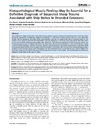Identificador persistente para citar o vincular este elemento:
https://accedacris.ulpgc.es/jspui/handle/10553/45731
| Título: | Histopathological muscle findings may be essential for a definitive diagnosis of suspected sharp trauma associated with ship strikes in stranded cetaceans | Autores/as: | Sierra Pulpillo, Eva María Fernández Rodríguez, Antonio Jesús Espinosa de los Monteros y Zayas, Antonio Arbelo Hernández, Manuel Antonio Diaz Delgado, Josue Andrada Borzollino, Marisa Ana Herráez Thomas, Pedro Manuel |
Clasificación UNESCO: | 310907 Patología | Palabras clave: | Histopathology Cetacean pathology Ship strikes Sharp trauma |
Fecha de publicación: | 2014 | Proyectos: | Bioindicadores Del Sindrome de Estres Post Varamiento en Cetaceos Patología Embolico "Gaseosa/Grasa" en Cetáceos C200801000288 Dirección General de Innovación |
Publicación seriada: | PLoS ONE | Resumen: | Ship strikes are a major issue for the conservation of may cetacean species. Certain gross and microscopic criteria have been previously reported for establishing a diagnosis of death due to ship strikes in these animals. However, some ship-strike injuries may be masked by advanced carcass decomposition and may be undetectable due to restricted access to the animals. In this report we describe histopathological muscular findings in 13 cetaceans with sharp trauma from ship strikes as the cause of death. Skeletal muscle samples were taken from the incision site and from the main locomotor muscle, the longissimus dorsi, in areas not directly affected by the sharp injury. The microscopic findings in tissues from both sites mainly consisted of haemorrhages; oedema; flocculent, granular or/and hyalinised segmentary degeneration; contraction band necrosis; and discoid degeneration or fragmentation of myofibres. We propose that skeletal muscle histopathology provides evidence of ante-mortem injuries even if the sample was taken elsewhere in the carcass and not only within or adjacent to the sharp trauma site and despite the advanced decomposition of some of the carcasses. This method helps to establish the diagnosis of ship strike as the cause of death. | URI: | https://accedacris.ulpgc.es/handle/10553/45731 | ISSN: | 1932-6203 | DOI: | 10.1371/journal.pone.0088780 | Fuente: | PLoS ONE [EISSN 1932-6203], v. 9(2), (e88780) |
| Colección: | Artículos |
Citas SCOPUSTM
23
actualizado el 08-jun-2025
Citas de WEB OF SCIENCETM
Citations
24
actualizado el 08-feb-2026
Visitas
102
actualizado el 10-ene-2026
Descargas
127
actualizado el 10-ene-2026
Google ScholarTM
Verifica
Altmetric
Comparte
Exporta metadatos
Los elementos en ULPGC accedaCRIS están protegidos por derechos de autor con todos los derechos reservados, a menos que se indique lo contrario.
